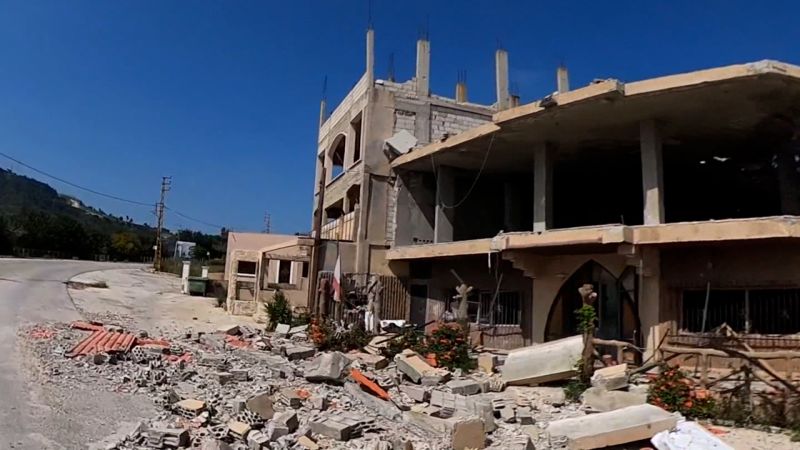Shredded Lebanese and Hezbollah flags tower over a destroyed boardwalk where a panoramic view of Israel’s Upper Galilee stretches out for miles.
“Buses (of people) used to come here just to see the Holy Land,” says Lt. Col. Juan Garcia Martinez, part of Spain’s peacekeeping mission in southern Lebanon.
Craters pepper the roads and debris covers the sidewalks. Apart from a few Christian-majority villages that have largely been spared Israeli fire, the area is full of ghost towns — a mirror image of the northern-region of Israel where tens of thousands of residents have fled the fighting.
More than 30,000 people have been displaced from the Lebanese area in the immediate perimeter of the 49-mile border, according to local authorities. Only one school remains functioning. More than 300 people — mostly fighters — have died in Israeli strikes. Eight civilians have been killed in Hezbollah attacks in northern Israel since last October. There have been Israeli soldier deaths in the cross-fire though the IDF has not provided an official tally.
A flare-up ensued, more intense than the usual daily exchange of fire, and more consequential due to a possible Iranian retaliatory attack on Israel expected as soon as this weekend.
Hezbollah — the most powerful non-state actor in the region — coordinates closely with Iran. Mohammad Reza Zahidi, one of two high-ranking Iranian commanders killed in the April 1 airstrike on Tehran’s consulate in Damascus, was a key intermediary between Iran’s revolutionary guards and Hezbollah.
Iran has vowed to avenge the deaths. That raised the specter of a conflict regional in scope and possibly catastrophic in its aftermath.
Speculation swirled about whether Hezbollah would take part in Iran’s expected attack. But a Lebanese source familiar with the matter ruled this out. The attack will be “purely Iranian,” the source said.
US intelligence appears to tally with this. The US has observed Iran moving military assets around inside its own country, including drones and cruise missiles, signaling a possible attack on Israeli targets from inside its territory, according to two people familiar with US intelligence.
The US expects Iran to carry out direct strikes against targets inside Israel, according to a senior administration official and a source familiar with the intelligence.
On Friday, Iran’s Supreme Leader Ali Khamenei appeared before a crowd wielding a rifle as he reiterated vows of revenge. Israel has been in a heightened state of alert since April 1. The widespread apprehension prompted officials there to urge people to refrain from stocking up on food, generators and medicine, as the country braces for the response.
Still, US officials expect Iran’s attack to be calibrated to avoid a regional war. Meanwhile, Iran will seek to reassert itself as a regional force to be reckoned with, analysts say.
“The broader objective for Iran seems to be one of de-escalation,” wrote Sina Toosi, a DC-based Iran analyst and senior fellow at the Center for International Policy, in a post on X, “Tehran’s strategy aims to incrementally increase the repercussions for Israeli aggression, thereby deterring future incidents without escalating to an all-out war.”
Iran has sought to walk that tightrope since it first entered the fray of the Iran-Hamas war in October. Its paramilitary partners — including Hezbollah and Yemen’s Houthis who have repeatedly struck a key Red Sea shipping route — link their battles to the war in Gaza.
“We repeat, if it ends in Gaza, then it ends here,” Nasrallah said in a speech last week.
Yet the conflict in Lebanon increases in complexity the longer Israel’s offensive in Gaza goes on.
When warnings about a possible Iranian attack reached fever pitch on Friday night, Hezbollah launched a barrage of rockets at Israel’s Upper Galilee, producing slew of intercepts from Israel’s anti-missile Iron Dome system.
It provided a glimpse of how Hezbollah might attempt to overwhelm Israel’s defensive systems as Iran conducts its expected attack.
The flighting on the Lebanon-Israel border has also re-opened long festering issues over the frontier, known as the blue line.
Over the last six months, negotiations over the armistice line between Lebanon and Israel – imposed by the United Nations in 2000 after Hezbollah forced out a 22-year Israeli occupation – have been revived. Meanwhile, Western leaders have mounted pressure on Lebanon’s government to pull Hezbollah from the border area.
Hezbollah’s supporters say this is far-fetched, and, at best, unenforceable. But this diplomatic can of worms could protract the conflict in Lebanon.
From one of Spain’s bases near the demarcation line, there is a clear view of a microcosm of Lebanon’s long-standing border issues with Israel.
A verdant green field sowed with mines separates the base from the town of al-Ghajar. The blue line can be seen cutting through the town and splitting it in two. During the Israel-Lebanon war of 2006, Israel occupied the rest of the village — a UN watchtower marks the tip of the Israeli-occupied territory.
“We are soldiers. We have to constantly adapt to the changing situation,” said Captain Hector Alonso from a viewing point overseeing Ghajar. Asked if Alonso’s unit was prepared for the growing danger of the present moment, he said: “We are prepared.”



























